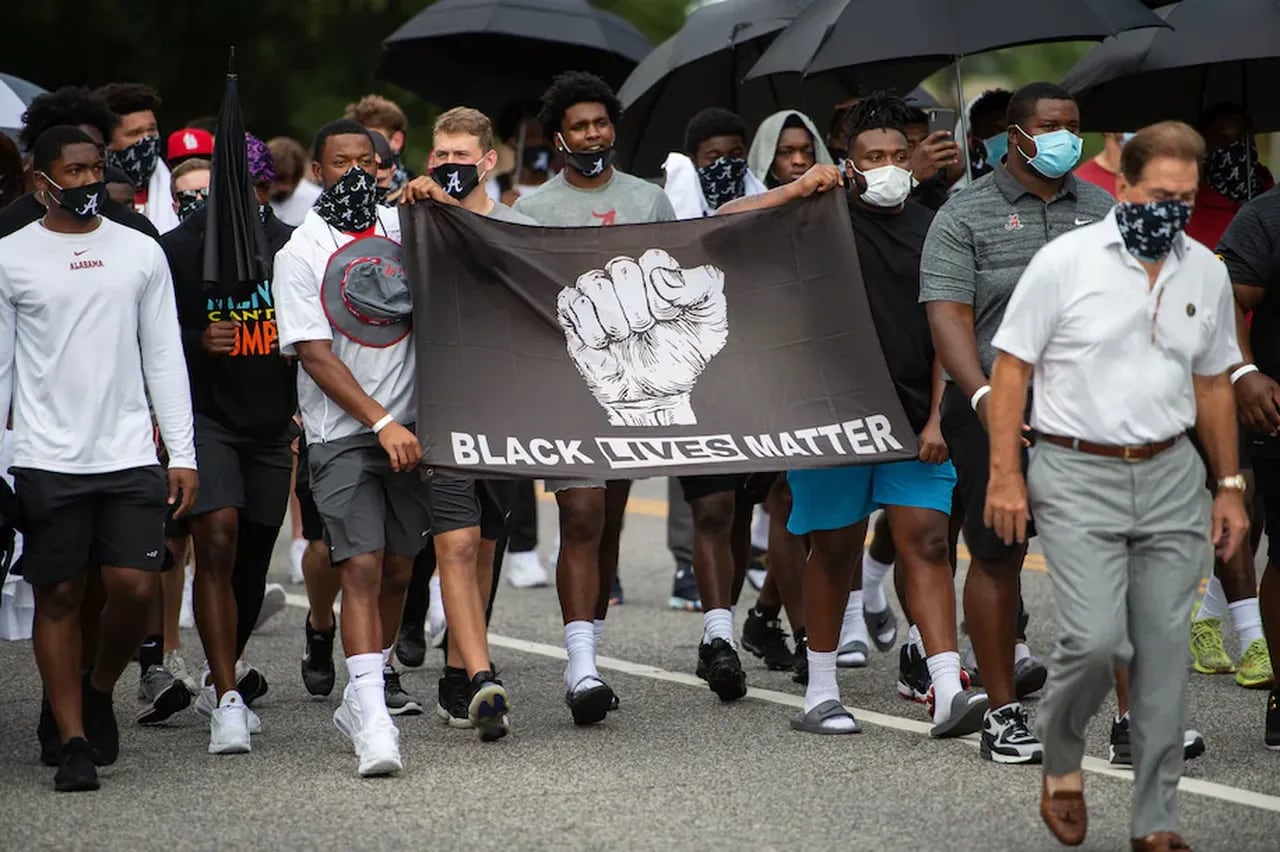Roy S. Johnson: Charles Barkley has ‘so much respect’ for Saban’s request after George Floyd murder
This is an opinion column.
Something needed to be said. Nick Saban knew something needed to be said to his team, to the young men whom he promised to care for, to nurture, to help mature into the men they aimed to be. Something needed to be said; he just didn’t know what.
Saban was in his late sixties then, almost three years ago now—on the cusp of seven decades on this Earth, long enough to have seen some things. A white man in his late sixties, old enough to have seen injustice and tragedy, to have seen the best and worst in our nation’s torturous racial journey.
To have seen how it shaped young Black men, especially those who came to play for him at the University of Alabama. Alabama.
Then George Floyd was murdered. The Black man’s neck was crushed beneath the knee of Minneapolis Derek Chauvin as Floyd called out to his dead mother.
Something needed to be said; Saban just didn’t know what.
So he called Charles Barkley.
“He asked me to speak to his team twice,” Charles shared with me a few hours after Saban announced his retirement after 17 seasons with the Tide. “One time he asked me to speak about competing. Then, and this is why I’m crazy about the guy, he asked me to come speak to his players about George Floyd.
He said, ‘Hey, I need a favor.’ I said, ‘Of course, Coach, what do you need? He said, ‘I’m a sixty-something-year-old white guy. I don’t know what it’s like to be Black. I’d like my guys to hear from you.’ It meant a great deal to me that he had faith and trust in me at that time. It was tough. It’s still tough.”
Barkley is pure War Eagle, but he unabashedly echoed the accolades pouring in regarding Saban, and, like some others, inferred the coach’s departure after winning seven national titles, six at Alabama, may have been influenced by the shifting landscape of college sports.
“I was obviously surprised,” he said, “wasn’t totally shocked. He’s obviously the greatest coach ever in college football. I got so much respect for the guy—just watching greatness and what he did for the state of Alabama is so incredible. But anybody’s got to be frustrated with the state of college sports right now. It’s an interesting time.”
Barkley referred to Colorado Coach Deion Sanders’ social media post, saying. “WOW! I knew it would happen 1 day soon but not this soon. The game has changed so much that it chased the GOAT away. College football, let’s hold up our mirrors and say HONESTLY what u see.”
“Deion had a great post,” Barkley said. “He’s a great dude, very profound, and understands the whole thing. He said we really need to take a look in the mirror. We really do because—call it hindsight—but this ain’t what it’s supposed to be, man. I love all my players being compensated, but giving college kids millions of dollars, I don’t think this was supposed to be.”
Barkley returned to his conversations nearly three years ago with the Tide’s Black players, and how what he heard still resonates in today’s tenuous political/racial climate. He spoke of the horrid incident at Bryant-Denny following the Tide’s 34-24 loss to Texas when some Alabama fans yelled racist and homophobic slurs at Longhorn players while celebrating on the sideline.
“Can you imagine a young Black kid having to hear that and can’t say anything about it.?” Barkley rhetorically asked. “So. for [Saban] to reach out to me and say, ‘Hey, I don’t know how to talk to my Black players about this George Floyd situation’ and the players are telling me. ‘Yo, man, how do I handle when racial things come at me across the Internet?’”
Amid furious days of reaction and speculation, few will recall how Saban navigated his team through a searing time in our nation, a delicate time. How he marched with them from Mal Moore to the only place on the campus where it could be unequivocally clear a stake was being driven through the insipid taunt shut up and play’s hardened heart.
To the place where George Wallace once stood as Alabama’s Governor and told two young Black people, in essence, Shut up, you’re not welcome here. Now. Tomorrow. Or forever.
Few will recall—except those who will always remember.
RELATED: Tide athletes, coaches pull the plug on Shut up and play’
“It was a really, really good conversation,” Barkley recalled. “I really appreciate him reaching out to me saying, ‘Hey, I can’t answer those questions.’ I just got so much respect for the guy for doing that.”
For doing what few will remember—except those who can never forget.
I’m a member of the National Association of Black Journalists Hall of Fame and a Pulitzer Prize finalist for commentary. My column appears on AL.com, as well as the Lede. Tell me what you think at [email protected], and follow me at twitter.com/roysj, or on Instagram @roysj
